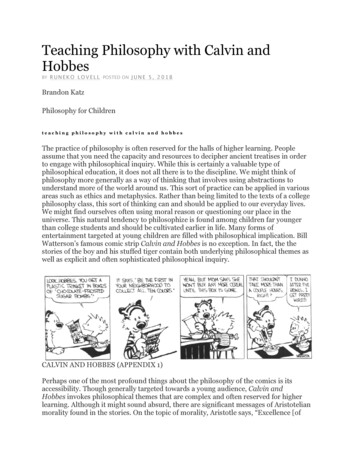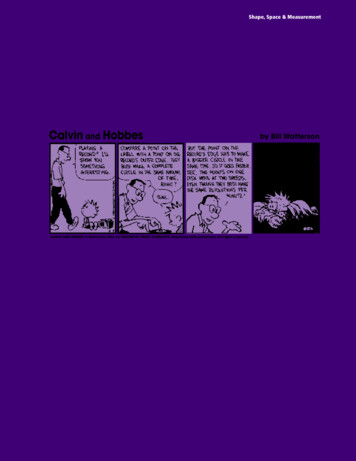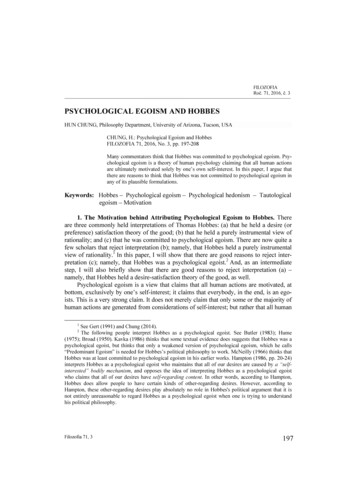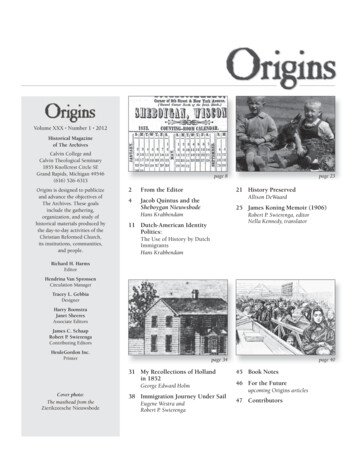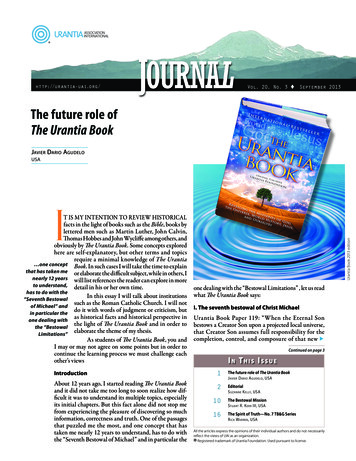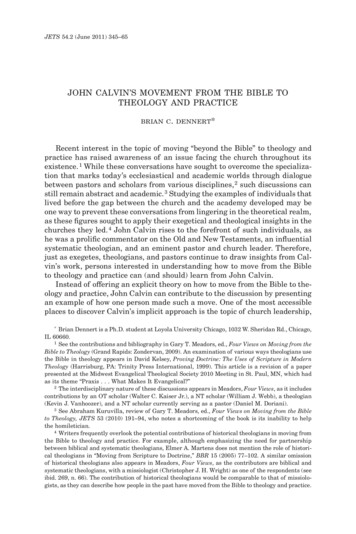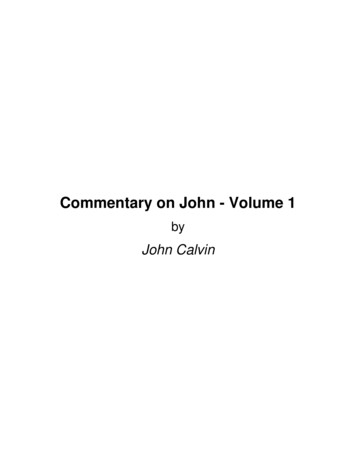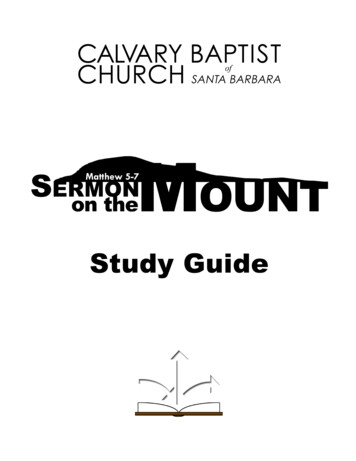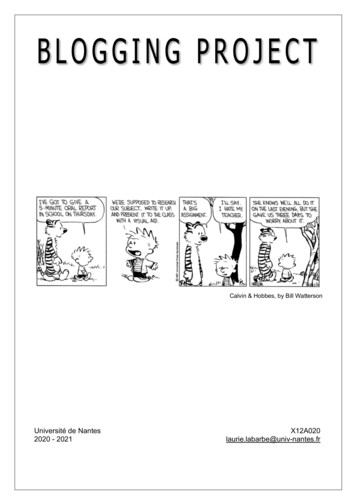
Transcription
Calvin & Hobbes, by Bill WattersonUniversité de Nantes2020 - 2021X12A020laurie.labarbe@univ-nantes.fr
BLOGGING PROJECTCLASS ATTENDANCEq Attendance remains OBLIGATORYq Please remember to notify your group teacher (preferably in advance) if you cannot attend asession, AND connect to http://abs-sciences.univ-nantes.fr/. Please note that, if unaccounted for,absences will lead to a direct penalty on your grade.q Absences with no acceptable justification will result in direct mark reduction (1 absence –5; 2absences –10; 3 absences –20)Ø Being there is just a prerequisite: you actually have to work too qIMPORTANT: A NOTE TO NON-ATTENDEE STUDENTS (Dispensés d’assiduité)Ø Assessment procedures for DA students are specific. If you complete the in-class project andhave the DA status, your in-class project grades will NOT be taken into account, so if you do notsit the DA exam, you will get zero for the module.Ø For any questions regarding the DA exam, contact In groups of 4, you will create a blog on a theme of your choice.Your blog is going to be online, created on a blog creation platform such as https://www.wix.com/.Ø Follow the instructions in the “Final Project” section on Madoc to create your blog andsubmit both the address of your blog and a PDF version at the end of the semester.Your blog should be:Ø varied, with different types of sections (About, comments, reviews ) that will contain the blogpostsØ organised around a category and a theme: e.g. Art for Students, Fashion and Social Impact,Health & Fitness for the Lazy, Literature Shared with Friends, Music to Inspire You, News Decoded, Scientific Debates Today, Sports Around The World, Cars We Forgot About, BusinessFor Beginners, IT For People Who Hate Computers : Bonuses will be awarded for originality.Ø around 3,500 to 4,500 words in length and should be user friendly (include a table of contents,and make the blog easy to read and navigate, with 4 or 5 tabs for the main sections that regroupdifferent blog posts). Also, maintain a consistent tone and page layout throughout the blog.qSPEAKINGYou will then carry out a 10-minute oral presentation of your project. This presentation should not consist ina reading out of your written work ( not just reading articles from the blog) but should rather be a “history” ofits creation:o Explain your theme choice: who is your blog for?o Present the entries you chose to include and justify your choiceo Explain how the blog is organized (show that it is user-friendly and easy to read!)o Highlight a couple of examples from interesting contents presented in your blogo Say what challenges you faced (and how you responded to them), and/or what you enjoyedduring the projectPowerPoint presentations will be highly appreciated provided you don’t read what is written on the slides!ASSESSMENTYou will receive two marks for the project:q one group mark for the written part (the blog itself)q individual marks for the oral presentation.-2-
LESSON PLAN AND HAND-IN DATESThere will be 12 project sessions in total. The first nine sessions will be dedicated to input and speakingactivities. Presentations will take place in sessions 11 and 12.The “written” part of the project ( the blog itself) must be submitted on the last session at the latest(see “Final Project” section on Madoc) – unless otherwise specified during the semester. You may beasked to submit your oral presentation as recorded videos: follow your group teacher’s instructions.SESSIONS:Session 1Session 2Session 3Session 4Session 5Session 6Session 7Session 8Session 9Session 10Sessions 11 & 12Blog typesWriting about YourselfAnecdotes and storytellingWriting a Blog Series – 5 Vlog TemplatesWriting a Blog Post – How Social Media Is Rewiring Our BrainsCommentingThe Flog – QuizzesWriting a reviewPresentation skillsIn Class PreparationPresentationsIMPORTANT: ONLINE LEARNING ACTIVITIESCompulsory activities:The online learning activities (Phonetics) must be prepared on Madoc. They are part of the online materialyou will have to work on this semester. It is YOUR responsibility to complete them as they will NOT becovered in class.Optional activities:Use the following link: http://madoc.univ-nantes.fr/course/view.php?id 31672or visit the Online Training Page on Madoc for useful grammar revisions, methodology advice and quizzesabout science videos.COMMUNICATION:We will communicate with you using your university-provided e-mail address (xxx.xxx@etu.univ-nantes.fr)exclusively. You need to check your univ e-mail regularly or you will miss important information such as oralor written exam dates, or deadline changes.If you have any questions ask your group teacher and/or get in touch with me!Laurie Labarbe – laurie.labarbe@univ-nantes.fr-3-
A NOTE ON PLAGIARISMThe University has engaged in a fight against plagiarism.WE WILL USE ONLINE PLAGIARISM DETECTION TOOLS (Compilatio random checks ).Take good note of the rules reminded on the university website (keyword “plagiat”; 54405/0/fiche pagelibre/&RH INSTITUTIONNEL FR- Specifically, regarding your project, this may include copying passages from the internet or anyother source without explicitly mentioning the source.- Please note also that the use of automatic translator programmes will be easily detected andassimilated to plagiarism.- We finally ask you to be vigilant, as if an instance of plagiarism is detected in a project, the wholegroup will be held responsible, and duly sanctioned.Charte anti-plagiat de l'Université de NantesApprouvée par le Conseil d’administration de l’Université de Nantes en date du 21 octobre 2011PréambuleL'Université de Nantes est engagée contre le plagiat, afin de garantir la qualité de ses diplômes et l'originalité despublications pédagogiques et scientifiques de ses personnels enseignants et/ou chercheurs. Les travaux quels qu’ilssoient (devoirs, compte-rendu, mémoire, cours, articles, thèses), réalisés aussi bien par les étudiants que par lespersonnels universitaires, doivent toujours avoir pour ambition de produire un savoir inédit et d’offrir une lecture nouvelleet personnelle d’un sujet. La présente charte définit les règles à respecter en la matière, par l’ensemble des étudiants etuniversitaires.Article 1Les étudiants et les personnels sont informés que le plagiat constitue la violation la plus grave de l'éthique universitaire.Le plagiat consiste à reproduire un texte, une partie d’un texte, toute production littéraire ou graphique, ou des idéesoriginales d’un auteur, sans lui en reconnaître la paternité, par des guillemets appropriés et par une indicationbibliographique convenable.Article 2Les étudiants et les personnels s'engagent à ne pas commettre de plagiat dans leurs travaux, quels qu'ils soient :devoirs et compte-rendu remis par les étudiants à un enseignant, mémoire, cours, articles de recherche, thèse. Le fait decommettre un plagiat en vue d'obtenir indûment une note, un diplôme ou un grade universitaire est une circonstanceaggravante. Le fait de commettre un plagiat dans un document destiné à être publié, mémoire de master ou de thèse,article à paraître dans une revue, est aussi une circonstance aggravante. La reproduction d'une oeuvre originale sans leconsentement de l'auteur est de plus qualifiée juridiquement de contrefaçon (articles L. 335-2 et L. 335-3 du code de lapropriété intellectuelle).Article 3Les étudiants et les personnels s'engagent à citer, en respectant les règles de l'art, les travaux qu'ils utilisent oureproduisent partiellement. Les reproductions de courts extraits en vue d'illustration, ou à des fins pédagogiques sont eneffet autorisées sans nécessité de demander le consentement de l'auteur. Néanmoins, la méthodologie d'un travailuniversitaire, quel qu'il soit, implique que les emprunts soient clairement identifiés (guillemets) et que le nom de l’auteuret la source de l’extrait soient mentionnés. Les travaux universitaires ne consistent pas en la reproduction d'une ou deplusieurs sources, mais doivent toujours avoir pour ambition de produire un savoir inédit et d'offrir une lecture nouvelle etpersonnelle du sujet.Article 4L'Université de Nantes se réserve le droit de rechercher systématiquement les tentatives de plagiat par l'utilisation d'unlogiciel de détection de plagiat. Les étudiants et les personnels s'engagent à communiquer, sur simple demande del'Université, une version numérique de leur document avant publication, afin de permettre cette détection.Article 5Les manquements à la présente charte sont passibles de sanctions disciplinaires : avertissement, blâme, annulation dudiplôme préparé, exclusion de l’Université pour une durée limitée, exclusion définitive de l’Université, exclusion de toutétablissement public d’enseignement supérieur pour une durée limitée, exclusion définitive de tout établissementd’enseignement supérieur. Les auteurs présumés de plagiat seront systématiquement traduits devant la sectiondisciplinaire compétente. La procédure disciplinaire ne présage pas d'éventuelles poursuites judiciaires dans les cas oule plagiat est aussi caractérisé comme étant une contrefaçon. Toute information complémentaire sur les textes législatifset réglementaires en vigueur et les règles de l'art pour la citation, peut être consultée dans le dossier plagiat sur le sitede l'Université de Nantes : http://www.univ-nantes.fr/charte-antiplagiat.-4-
BLOGGING PROJECT FAQsCan I work on the project on my own?No, you cannot. The blogging project is a group project; being able to manage the work collectively and to compromise ispart of the project.What if all the other group members drop out of university and I end up on my own?You cannot do the project alone, so if the other members of your group drop out of university, you have to tell your teacheras soon as possible so you can be assigned to another group; this does mean that you will have to adjust to another groupand another theme. If you fail to tell your teacher about the problem, you may be prevented from presenting your work,which would mean that you would fail the module.What if I am sick on the day of the orals?First of all, if you are absent, don’t forget to go to the Scolarité (Registrar’s Office) with proper documentation for yourabsence to be excused. Also contact your group teacher about your absence so they can plan accordingly.If you are absent for your oral presentation and haven’t taken any steps to excuse your absence, you will get a zero for theoral part of the project, whether or not you contact your group teacher to arrange for another oral.If your absence is excused, then you and your group will be asked to come back at a later date to present your work. Ifyou do not do that presentation, you will ALL get zero for the oral part of the project.My group and I used an image from the internet and forgot to give the source. Will there be anydisciplinary action against us?It is not good practice not to cite the sources of the images you use. However, if you forget the source for an image in yourproject, we will not refer you to the disciplinary committee.What you should be very careful about is plagiarism in your text; this will be detected and will be penalized severely.If I rephrase the sources I use, is this still plagiarism?Plagiarism refers not only to an idea, but also to the way an idea is phrased. If you use someone else’s ideas and/or words,you need to be very clear about what belongs to the original author and what belongs to you. So if you entirely rephrasean author’s idea without using their words at all, you still need to make it clear that the idea wasn’t your own. If you use anauthor’s words, you need to put those words in quotation marks. If you rephrase part of what the author said but still usedsome of the original author’s phrasing without using quotation marks and documenting the source properly, it is plagiarism.There is a video on MADOC about plagiarism from the Université du Québec. Harvard University also has an interestingwebsite on the different kinds of plagiarism, with annotated examples. The following quotations are taken from this page.I encourage you to take a closer look at the page d k70847&pageid icb.page342054):“If you copy bits and pieces from a source (or several sources), changing a few words here and there without eitheradequately paraphrasing or quoting directly, the result is mosaic plagiarism. Even if you don't intend to copy the source,you may end up committing this type of plagiarism as a result of careless note-taking and confusion over where yoursource's ideas end and your own ideas begin. You may think that you've paraphrased sufficiently, or quoted relevantpassages, but if you haven't taken careful notes along the way, or if you've cut and pasted from your sources, you can losetrack of the boundaries between your own ideas and those of your sources. It's not enough to have good intentions and tocite some of the material you use. You are responsible for making clear distinctions between your ideas and the ideas ofthe scholars who have informed your work.”“When you paraphrase, your task is to distill the source's ideas in your own words. It's not enough to change a few wordshere and there and leave the rest; instead, you must completely restate the ideas in the passage in your own words. If yourown language is too close to the original, then you are plagiarizing, even if you do provide a citation.”“When you use your own language to describe someone else's idea, that idea still belongs to the author of the originalmaterial. Therefore, it's not enough to paraphrase the source material responsibly; you also need to cite the source, evenif you have changed the wording significantly.”I used quotation marks throughout the project to make sure I wasn’t plagiarizing and still got penalized.Why is that?The blogging project is about having you write your own texts. It is a very good exercise to practice your writing skills andit is supposed to help you enrich your vocabulary and hone your grammar skills. If most of your work was written bysomeone else, then you did not abide by the rules of the project. We will not consider your work to be plagiarized if youproperly document the sources you used and use quotation marks correctly, but we will penalize you for not doing the workyou were assigned.Someone else in my group plagiarized but I most certainly did not. This is clear from the fact that weindicated the name of each contributor under each text. So why am I also penalized?The work you hand in is done collectively. You are not supposed to focus on only one part (so it is useless to write yourname anywhere except on the cover or at the back), and it is your responsibility to check each other's work.-5-
PLANNING – PROJECT PROGRESS CHECKS1- S2Before next session, decide who you’re going to team up with for the project and start brainstorming ideas andthemes. Don’t restrict yourselves to one idea straight away; consider a few possibilities and evaluate thefeasibility of each option before you decide to discard or keep it.Tip: Throughout the project, keep a group and a personal logbook. In the group logbook, keep track ofcollective discussions and decisions, and in your individual logs, write down your actions, decisions, andthoughts about the project. Also keep track of the challenges you faced, as a group and individually, and howyou overcame them. Doing this will make it easier for you to prepare for the oral presentation and will help youorganize your work throughout the project.S2- S3By now you should know who your teammates are going to be on this project. By next session, you shouldhave made a decision on what your blog is going to be about.Make sure your project is feasible by listing potential problems raised by your choice and finding solutions tothem. Keep track of the problems and solutions in your logbook.Tip: Do not bite off more than you can chew. Sometimes, you can get so enthusiastic about an idea that youforget to check that your methodology is good, and that quantity does not come at the expense of quality. Youneed to ensure that your blog is well designed and well thought-out, that it makes sense and that it is consistent,user-friendly, informative, and well formatted. It is better to restrict yourselves to the amount of contentindicated in the instructions and spend more time thinking about the way you are going to present theinformation rather than try to cram every idea you have into the blog and risk making it a mess.You will find on Madoc Final Project Blog Project Checklist (Collaborative) a checklist of things to do in thepreparation of your blog, and criteria for a good blog. You and other students are tasked with creating the list.S3- S4By now you should have finalized your choice of theme for your blog, and you should have resolved the majorproblems your choice may have raised.You need to choose the sections your blog will be divided into and discuss collectively about the type of contenteach section and article will include so that there are no repetitions or inconsistencies. Finally, you should alsotalk about what you want your blog to look like so you all know the format while you are writing.S4- S5Now that you have planned out your content, you need to decide on how you are going to share the workwithin the group. Then you can all start drafting your texts and infographics.Tip: Even if you have divided up the work, it does not mean that you are responsible only for the part you havewritten, so make sure that you have enough time before you hand in your blog for everybody to re-read it andmake suggestions for adjustments. Ultimately, you are all responsible for the whole project. That also meansthat if you are stuck and need help, you should not hesitate to ask the other members of your group to helpyou.You can decide on a timeslot when you can all see each other throughout the project, even if it cannot be forlong, so that you can compare notes, check up on each other’s progress to make sure there is no problem,and suggest solutions if one of you has difficulties with their work.S5 - S6By now you should have all started writing your parts. If you haven’t done so already, you should schedule agroup meeting so that you can see where everybody is at. Take a step back and look at what you have so farwith a critical eye to assess if there are no methodological issues, and adjust your work accordingly.S6- S7Schedule another group meeting to make sure everybody is on track.Take a step back and look at what you have so far with a critical eye to assess if there are no methodologicalissues, and adjust your work accordingly.S7- S8-6-
PLANNING – PROJECT PROGRESS CHECKBy now you should have almost finished writing. You need to schedule a group meeting to make sure you areall on track.You also need to start the editing process: Re-read each other’s work, suggest improvements or changes, andthen once you are all comfortable with the content, put everything together, making sure the formatting isconsistent throughout and the information logical. Then look at the end result critically and make any necessaryadjustments.Keep an eye out for content that is plagiarized, whether consciously or not, as this will be severely penalizedand you are all responsible for the entire project.S8- S9By now the blog should be ready, or very close to ready. You should start discussing the oral presentation.Don’t forget to read the instructions on p.2 to know what information you should include, and then agree onthe outline of your presentation and divide up the work. Now is a good time to go through your logs and seewhat information you can use from them.S9- S10When you arrive for the in-class prep session next time, you should bring the drafts of your presentation withyou to class, along with a list of questions for your teacher. During session 10, put the finishing touches onyour oral presentations and prepare your slides. The in-class prep session is also a good opportunity to askyour teacher pronunciation questions, since pronunciation is crucial in any oral presentation.Before you deliver your presentation, you should also make sure that you have rehearsed it together.Remember that pronunciation and delivery will be very important and give each other advice and support.-7-
SESSION 1: Blog TypesTypes of blogs: Match the categories on the left to the definitions on the rightDescriptions adapted from s/A. Personalexperience blog1. These blogs focus on a particular subject, such as political blogs, journalismblogs, health blogs, travel blogs (also known as travelogs), gardening blogs,house blogs, book blogs, fashion blogs, beauty blogs, lifestyle blogs, party blogs,wedding blogs, photography blogs, project blogs, psychology blogs, sociologyblogs, education blogs, niche blogs, classical music blogs, quizzing blogs, legalblogs (often referred to as a blawgs), or dreamlogs. How-to/Tutorial blogs arebecoming increasingly popular.B. Business blog2. These types of blogs make it possible for teachers and students to collaborateon classroom projects. Teachers can have students create blogs either throughthe school’s internet system or public sites such as blogspot.com, where they candiscuss texts that have been assigned, films viewed, or lectures. Students andteachers can comment on each other’s blogs.C. School blog3. This type of blog is an ongoing online diary or commentary written by anindividual, rather than a corporation or organization. While the vast majority ofthese blogs attract very few readers, other than the blogger's immediate familyand friends, a small number of them have become popular, to the point that theyhave attracted lucrative advertising sponsorship.D. Professionalblog4. These blogs are a unique but modern type of blog. Instead of the ownercreating content, the content is supplied by the public. Such blogs have a teamwho moderate posts, prevent unpleasant interactions and promote slow topics forgreater interactivity. Despite the fact that this type of blog mostly contains contentfrom guest writers, the owner should also write posts of his or her own.E. Genre blog5. Bloggers who have these types of blogs do it to make money online. In otherwords, their career goal is to earn a salary through their blogging efforts. Thesebloggers tend to use a variety of monetization strategies to achieve this goal,including selling display ads, creating information and digital products, promotingother people’s products for a commission, and similar.F. Reverse blog6. These blogs are defined by the content they produce. If you enjoy videoblogging, then you’re a vlogger. If you curate content from other websites, youhave a linklog. If you post photos or art sketches on your blog, you’re hosting aphotoblog or artblog.G. Media blog7. Bloggers that write these types of blogs do it for their business. That could be abusiness they own or company they work for. Their goal is to gain more exposure,traffic, and ultimately customers for their business. Unlike the personal blogger,their writing is less focused on themselves and more focused on their businessand their industry.-8-
SESSION 1: Blog TypesSPEED BLOGGING GAMEChoosing an original topic for your blog can be a challenge Play the speed blogging game and see how itcan inspire you to some crazy combo!In groups of 4-5, individually, in turns.You are attending a bloggers’ convetion. Choose one of the proposed blog names and be prepared to give ashort speech to explain to your colleagues what your blog is about, who it is for, how you got the idea 1. Skiing with bears2. Suitcases and Nail Polish3. Recipes for young professionals4. Everything you need to know5. Pet cooking6. Roadsigns of the future-9-
SESSION 1: Tell everyone about 1START2a goodfilmyou’veseenrecently3what youlike to doin egoing todo nextweekend5a subjectyou’repassionateabout6yourfavouritefood9 Startagain7yourfavouriteTV show8the kindof musicyou esin yourtown35yourworstholiday11yourplans forthefuture1213somewhat youthing you like to doboughtin thelastwinterweek14 Goforward3spaces33your bestholiday31a trip youplan onmakingin thefuture30somethinggoodthat happened toyou thisyear29cyberbullying28yourdreamjob27a cityyouwouldlike tovisit15your useof Facebook50FINISH49shoppingin yourcity48 Startagain38somethingyou’regoing tobuy soon39 Goforward3spaces47the mostbeautifulbuildingin yourcity46a trip youmade45yourtypicalSunday44 Goback 6spaces43anactivityyouwouldlike to do34yourhometown40a foodyou hate41yourdreamtrip42concertvenuesin yourtown32 Goback 5spaces16amuseumyouwouldlike tovisit17a forumyou readorparticipate in18yourfavouritesport19a countryyouwouldlike tovisit20yourfavouritebook21yourfavouriteband uritephoneOS23your useof Twitter24a blogyoufollow25 Goback 4spacesAdapted from Neil CoghlanProject progress check:Before next session, decide who you’re going to team up with for the project and start brainstorming ideas andthemes. Don’t restrict yourselves to one idea straight away; consider a few possibilities and evaluate thefeasibility of each option before you decide to discard or keep it.Tip: Throughout the project, keep a group and a personal logbook. In the group logbook, keep track ofcollective discussions and decisions, and in your individual logs, write down your actions, decisions, andthoughts about the project. Also keep track of the challenges you faced, as a group and individually, and howyou overcame them. Doing this will make it easier for you to prepare for the oral presentation and will help youorganize your work throughout the project.- 10 -
SESSION 2: Types of Blog PostsTypes of blog posts: Match the type of post with the type of information you could include in itDescriptions adapted from -are-proven-to-work/1. Tutorials andHow-to Guides1. These are fantastic because it is likely that your readers have alreadygoogled these terms in hopes of an answer. You could write one long postanswering all your reader’s frequent questions. But it may be more beneficial tocreate a blog series by answering a common question once a week.2. Checklists2. From charts to lists to myths vs. facts, almost anything can be made into thattype of content. Admittedly, the more professional the look, the better, but youcan still make an incredible post by producing a chart you made in PowerPoint.The key is to create a chart or graph that helps explain things.3. Listicles3. We all look for tests and opinions about a product before purchasing. So whynot write a post giving your opinion on the latest gadget or service you’vebought? Write down the pros and cons, and give your recommendation.4. Infographics4. There is a reason why these posts are so viral — people need to eat! ForSEO purposes, be sure to include any alternate names for your dish or drink, aswell as giving very precise measurements and cooking instructions.5. Profile5. This type of content is simple to create. You probably make lists all the timesuch as your grocery list, supplies lists, to-do lists, etc. All you have to do is takethat same concept and apply it to your blog. To perfect the content, take acommon task and break it down into short, actionable items.6. Reviews6. We all enjoy these, especially if we can compare our results to everyone else.So why don’t you create a fun quiz for your readers? Don’t forget to add a socialshare to the bottom of your quiz results for others to see and join in.7. InspirationalStories7. This type of post can be written about anybody. The post should give somebiographical information about the person and links where users can find moreabout them. You should put information on why you chose this person, but alsoconsider adding some facts that aren’t well known so your post can stand out.8. Quizzes8. Use your current blog as a random plug for your favorite destination spot. Letothers live vicariously through you! Just remember to include pictures.9. FAQs9. Create a post around a controversial issue and dialogue from different sidesof the topic. Many times this is done as a blog series. The fun part is that youcan play devil’s advocate and argue for the side you disagree with.10. Rants10. Although controversy sells, so does inspiration. Hopeful stories go viralbecause it is something people want to experience themselves. So share yourstory of hope and watch it inspire others to do the same.11. Debates11. These posts are easy because they involve you talking about things you arealready familiar with. The most important thing is to break down your content intothe smallest steps and into the simplest terms. Don’t assume your readers knowwhat they’re doing.12. Recent TravelExperiences12. These are always among the most shared on the internet. You can create alist of just about anything. Perhaps it is a list of your favorite places to eat, yoursummer reading list, or your favorite web apps. The possibilities are endless.13. Recipes13. Yes! Speak your mind! Be free to share your frustrations! Just rememberthat whatever is posted on the internet stays on the internet. So do ampleresearch and have someone else read your post before you publicize it. Whilethese posts can become viral, they do have the potential to burn relationships.- 11 -
SESSION 2: Writing about YourselfExercises adapted from White, Genevieve. Writing. London: HarperCollins UK, 2014.Project Skills: Writing about Yourself – Read the four texts A—D and check everything you learn aboutMayumi from those texts.One of he
Calvin & Hobbes, by Bill Watterson Université de

